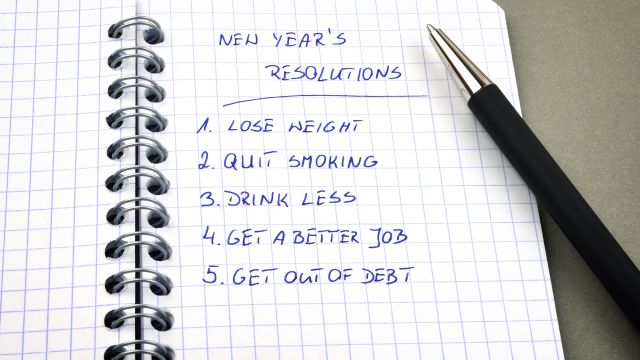It happens every year—come December 31, your New Year’s Resolutions list for the next year is long, inspiring and maybe a little intimidating, too. While it’s good to be ambitious when it comes to your health, your spirituality or any other area in your life you wish to improve, you have to be realistic so the changes will actually stick.
“A resolution is really a lifestyle change. We reflect over the last year of our life and look at the things that haven't been going very well. We want the next year to be better,” says Emily Newberry, LPC, of Coliseum Center for Behavioral Health in Macon, Georgia.
Map out your resolutions with these expert-approved tips and create realistic goals that you can actually achieve.
You have to be willing to change
When you start to think about your resolutions, you have to be motivated and willing to change in order to reach your goals, says Newberry. “If you aren’t, you're not going to be able to stick to them.”
If you’re having doubts, feeling reluctant or just feel like you’re not ready, it may not be the best time to start working towards that specific resolution. “Some people will think about it for months because they're not quite ready, so they think, ‘I'll be ready on January 1,’ but just because it's January 1 doesn't mean that you're ready,” adds Newberry.
Identify the problem, then come up with the solution
Once you’re ready to make an improvement, think about it like you’re making a specific behavioral change instead of setting goals. “You have to identify the problem first and then come up with the specific things you’re currently doing that perpetuates the problem.”
Specific changes are what you’re going to make to remedy the problem, and those are going to be your resolutions, or solutions. Why should you think about them like this? “You can’t change unless you know what you’re doing wrong,” says Newberry.
For example, if you’re overweight, think about why you are overweight. One of the reasons you may be overweight is because your dinner portion sizes are too big. You could resolve to change your dinner portion size by saving half of it for lunch the next day.
If you want to save more money but spend a fortune every week on on-the-go coffee, you already know what your obstacle is. Your resolution may be to put all the money you save each morning by forgoing your normal Starbucks run, in a jar each day, so you can add it to your savings account later.
Come up with a plan first
When it comes to resolutions or anything you want to succeed at really, Newberry says if you don't have a plan and prepare in advance, you’ll get tired, overwhelmed and may skip it all together. “We become very weak and we tend to have slip ups if there’s not a plan.”
To make sure you stay on track when adopting a new routine, think about the specific ways you can execute your resolutions. If reducing the amount of restaurant meals you eat during the workweek is your resolution, block off time each Sunday to prep your lunches for the week and plan out menus for your breakfasts and lunches.
It’s not about the number of resolutions
It’s good to have a long list of things you want to improve on, but too many may be overwhelming and unattainable. “If you start off with all these lofty goals, it may be too much change to your routine or lifestyle at once,” says Newberry. When you’re determining the changes you need to make, it’s better to think about how frequent the change is going to be.
“If it’s something you would change monthly you can probably do up to three things. If it’s something that requires a daily change or challenge, I would only try to do one thing at a time,” she advises.
If you want to run a 5k once a month and you want to donate your time to the local homeless shelter once a month, those are okay to do together. But, it’s not realistic to quit smoking and do away with sugar every single day.
Share your goals with someone
Embark on your changes with a friend or family member, or just share the strides you plan to take with someone, so they can hold you accountable. The more people that know about your resolutions, the more likely you’ll stick to your goals.
“Support is so important in every area of your life, but especially when you're trying to make changes. If there's a support group out there for whatever your resolution is, then use it because you won't regret it. The more support you have, the better,” says Newberry.
Having trouble getting up in the morning to work out? Book a class at the gym, or sign up for one-on-one personal training sessions. Knowing you’ll lose money if you don’t show up, or that someone is waiting for you at the gym may prevent you from hitting snooze.
If you know a friend who is also trying to quit smoking, see if they want to join you on the journey. You can talk through your successes—and your struggles—and hold each other accountable during social outings and stressful days.
Reward yourself
Planning out simple, realistic incentives along the way will help encourage you to stick with your goals.
If you eat healthy every day of the week, treat yourself to a movie on Friday night. The reward may keep you motivated, and you’ll feel good after having successfully stuck to your plan.
But remember that it’s not just about the reward you won’t get if you don’t follow through, there are other consequences to giving in, too. “If we don’t follow through with the change we wish to make, we may feel bad about ourselves, we may get off track and go right back to the way we were,” says Newberry.
Remember, it’s a gradual process
Like anything you’re working towards, you have to remember that it takes time for new routines and habits to feel normal. Start small and work your way up. You’re not going to have everything mastered come January 31. And make sure you realize this before you set your resolutions.
“Tweak the little things in your lifestyle and then about a month later, you will start to feel motivated and good about yourself.” After a month or so, you may even decide to add more goals and changes.
The goal is to start off realistic, so that you not only follow through with your resolutions, but you adopt the new habits as part of your lifestyle going forward. It’s a work in progress, and it’s good to be prepared for that from the beginning.






